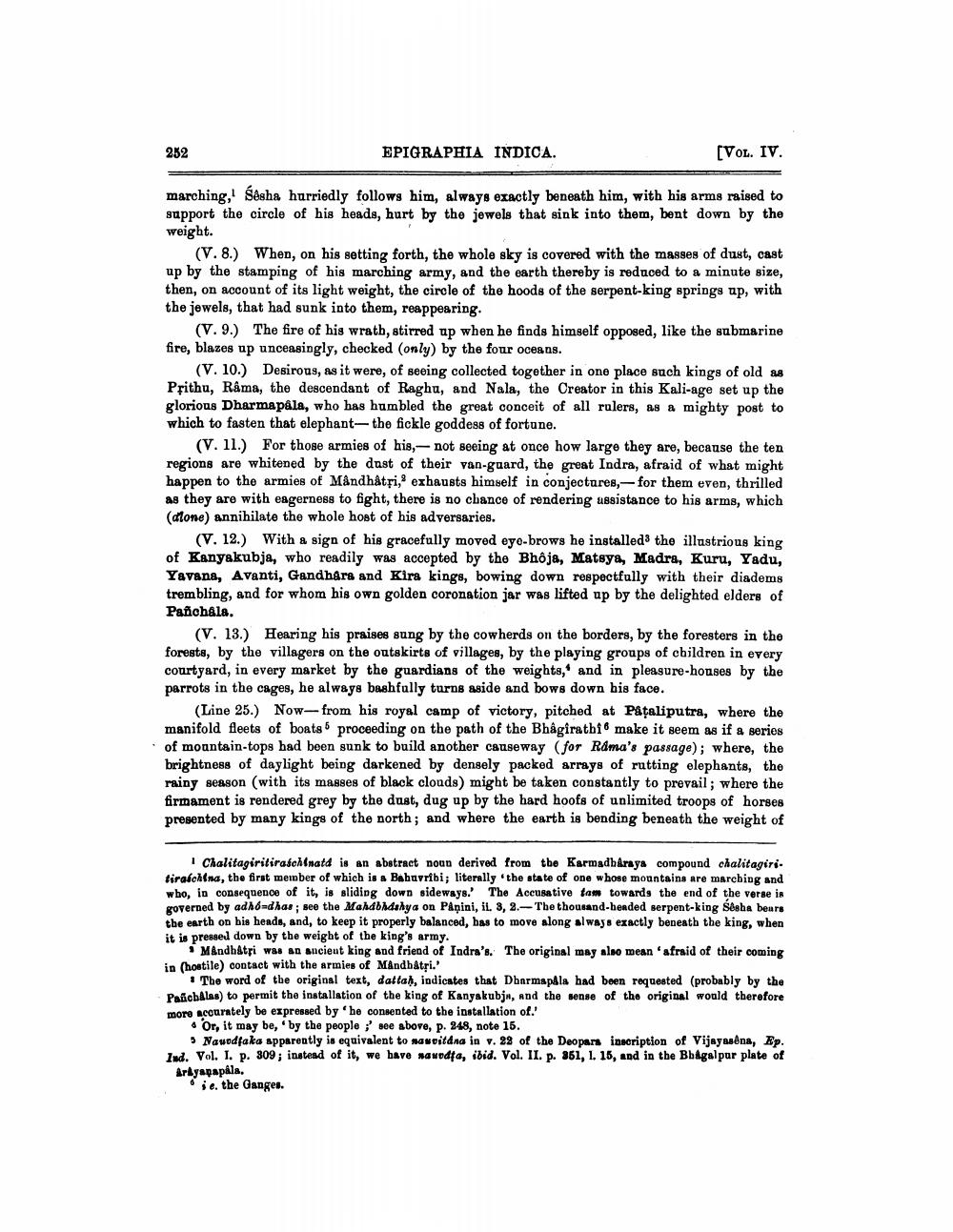________________
252
EPIGRAPHIA INDICA.
[VOL. IV.
marching, Sasha hurriedly follows him, always exactly beneath him, with his arms raised to support the circle of his heads, hurt by the jewels that sink into them, bent down by the weight.
(V. 8.) When, on his setting forth, the whole sky is covered with the masses of dust, cast up by the stamping of his marching army, and the earth thereby is reduced to a minute size, then, on account of its light weight, the circle of the hoods of the serpent-king springs up, with the jewels, that had sunk into them, reappearing.
(V. 9.) The fire of his wrath, stirred up when he finds himself opposed, like the submarine fire, blazes up unceasingly, checked (only) by the four oceans.
(V. 10.) Desirous, as it were, of seeing collected together in one place such kings of old as Prithu, Rama, the descendant of Raghu, and Nala, the Creator in this Kali-age set up the glorious Dharmapala, who has humbled the great conceit of all rulers, as a mighty post to which to fasten that elephant- the fickle goddess of fortune.
(V. 11.) For those armies of his, - not seeing at once how large they are, because the ten regions are whitened by the dust of their van-gaard, the great Indra, afraid of what might happen to the armies of Måndhátsi, exhausts himself in conjectures,- for them even, thrilled as they are with eagerness to fight, there is no chance of rendering ussistance to his arms, which (clone) annihilate the whole host of his adversaries.
(V. 12.) With a sign of his gracefully moved eye-brows he installed the illustrious king of Kanyakubja, who readily was accepted by the Bhoja, Matsya, Madra, Kuru, Yadu, Yavana, Avanti, Gandhars and Kira kings, bowing down respectfully with their diadems trembling, and for whom his own golden coronation jar was lifted up by the delighted elders of Panchala.
(V. 13.) Hearing his praises sung by the cowherds on the borders, by the foresters in the forests, by the villagers on the outskirts of villages, by the playing groups of children in every courtyard, in every market by the guardians of the weights, and in pleasure-houses by the parrots in the cages, he always bashfully turns aside and bows down his face.
(Line 25.) Now- from his royal camp of victory, pitched at Pataliputra, where the manifold fleets of boats o proceeding on the path of the Bhagirathi make it seem as if a series of mountain-tops had been sunk to build another causeway (for Rama's passage); where, the brightness of daylight being darkened by densely packed arrays of rutting elephants, the rainy season (with its masses of black clouds) might be taken constantly to prevail; where the firmament is rendered grey by the dust, dug up by the hard hoofs of unlimited troops of horses presented by many kings of the north; and where the earth is bending beneath the weight of
Chalitagiritirafcinatd is an abstract noun derived from the Karmadharaya compound chalitagiritirabchina, the first member of which is a Bahuvribi; literally the state of one whose mountains are marching and who, in consequence of it, is sliding down sideways. The Accusative tam towards the end of the verse is governed by adhordhas, see the Mahabhdshya on Påņini, il. 8, .-The thousand-beaded serpent-king Sasha beurs the earth on his heads, and, to keep it properly balanced, bas to move along always exactly beneath the king, when it is pressed down by the weight of the king's army.
Mindhátri was an ancient king and friend of Indra's. The original may also mean' afraid of their coming in (hostile) contact with the armies of Mandhatri.
1 The word of the original text, dattal, indicates that Dharmapala had been requested (probably by the PaîchAlas) to permit the installation of the king of Kanyakubja, and the sense of the original would therefore more accurately be expressed by 'he consented to the installation of.
. Or, it may be, 'by the people see above, p. 248, note 15.
» Nauodtaka apparently is equivalent to nascitdna in v. 28 of the Deopars inscription of Vijayasêna, Ep. Ind. Vol. I. p. 809; instead of it, we have saudta, ibid. Vol. II. p. 361, 1. 15, and in the Bhagalpar plate of Ar yapapala.
je. the Ganges.




